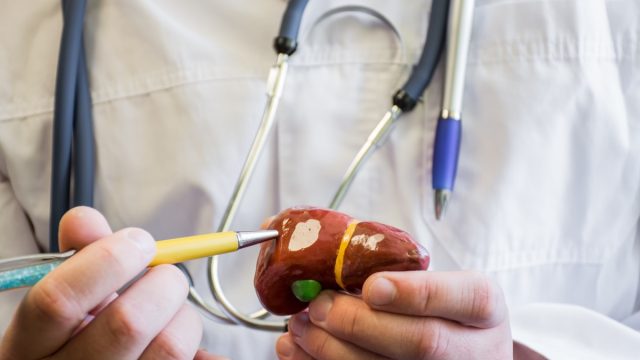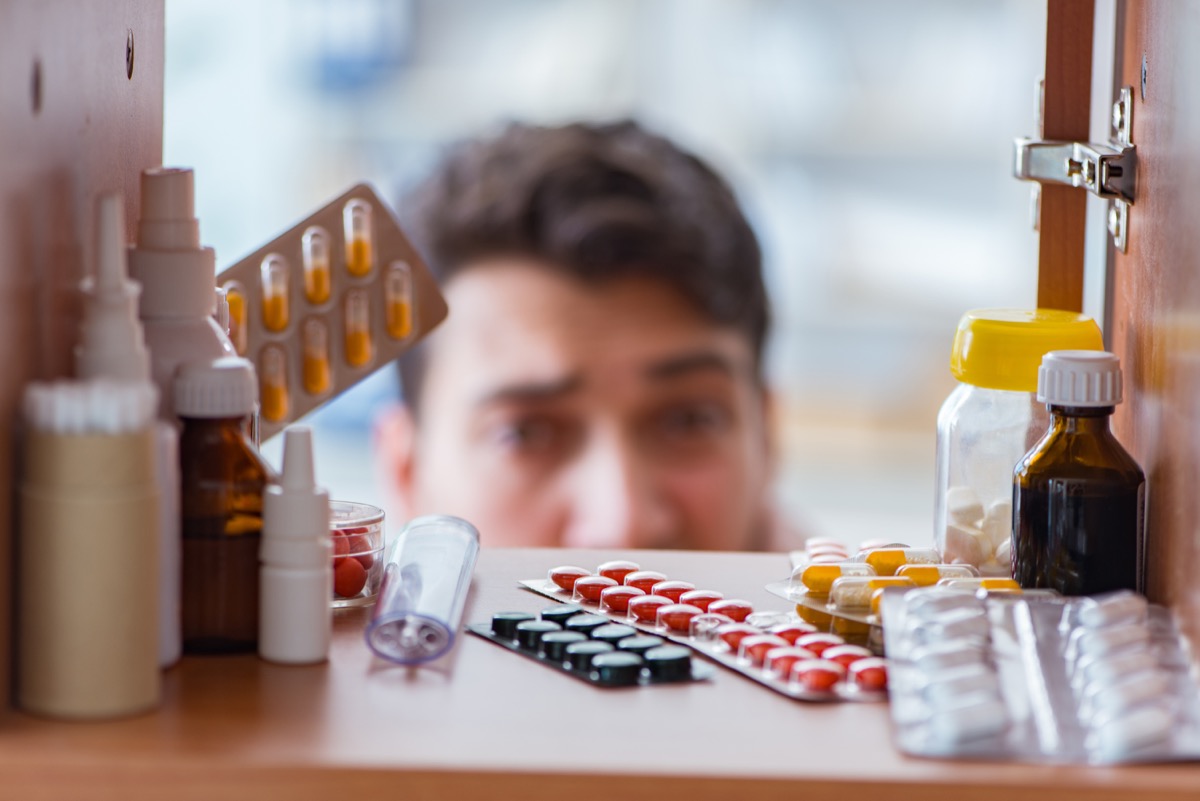5 Things Your Liver Wishes You’d Stop Doing, According to Experts

Perhaps the most under-appreciated organ, your liver is responsible for more than 500 vital functions. Besides breaking down toxic substances, it also produces bile to digest fats and remove waste, regulates your blood sugar levels, creates important nutrients, and so much more. However, despite the organ’s plentiful purposes, most people give little thought to their liver health. In fact, experts say there are a few key ways you could be putting your liver in harm’s way without even realizing it.
The good news? The liver is one of the only organs that can regenerate itself, and with a little TLC, many people can restore their liver health within a matter of weeks to months.
Read on to learn which five things your liver wishes you’d stop doing, and begin transforming your liver health today.
READ THIS NEXT: If You Notice This Around Your Eyes, Get Your Liver Checked.
1
Drinking too much alcohol

Last year, the World Health Organization (WHO) announced that no amount of alcohol is safe for your health. However, excessive drinking still poses the greatest threat to your liver health, experts say.
Heavy alcohol consumption can damage the liver and lead to a condition called alcoholic liver disease,” explains James Walker, MD, a physician and medical officer for Welzo. “The liver processes alcohol in the body, and excessive drinking can cause inflammation and scarring of liver tissue. This can eventually lead to liver failure, cirrhosis, and other serious health issues,” he tells Best Life.
The good news is that some cases of alcohol-related liver disease (ARLD) can be reversed if you stop or limit your drinking. “The liver is very resilient and capable of regenerating itself,” explains the U.K.’s National Health Services (NHS). “The main treatment [for ARLD] is to stop drinking, preferably for the rest of your life. This reduces the risk of further damage to your liver and gives it the best chance of recovering,” their experts note.
READ THIS NEXT: 6 Things Your Kidneys Wish You’d Stop Doing, According to Experts.
2
Eating too much sugar

Eating excessive amounts of added sugar can also damage your liver, Walker points out. “Consuming too much sugar can lead to a condition called non-alcoholic fatty liver disease (NAFLD). The liver metabolizes sugar and converts it into fat, which can accumulate in the liver if consumed in excess,” he explains. “This can lead to inflammation and scarring of liver tissue, impairing its ability to function properly.”
To reduce your chances of developing NAFLD and other health complications, experts recommend limiting your sugar intake to 10 percent of your total caloric intake. This means that if you consume a diet of 2,000 calories per day, no more than 200 of those calories should come from sugar.
3
Taking certain medications or supplements

Any medications or supplements you take are processed by the liver, the primary site for drug metabolism. However, some of these products can be harmful to the organ, Walker warns.
There’s a long list of drugs and supplements that are known to cause adverse effects on the liver, so you should always be sure to share a list of your medications with any new doctor or pharmacist. However, Walker says there are a few popular products that are commonly linked to poor liver health.
“Over-the-counter painkillers like acetaminophen (Tylenol) and prescription drugs like statins (used to lower cholesterol) can cause liver damage if taken in excessive amounts or for prolonged periods,” he tells Best Life. “Similarly, supplements like high-dose vitamin A and herbal supplements like kava and comfrey can also be harmful to liver health,” he adds. You may be at increased risk of liver damage if you take multiple medications at once.
For more health news sent directly to your inbox, sign up for our daily newsletter.
4
Eating a high-fat diet

Another major mistake when it comes to your liver health is eating a diet that’s full of unhealthy fats. “Consuming a diet high in saturated and trans fats can contribute to the development of NAFLD,” explains Walker. “The liver plays a crucial role in fat metabolism, and consuming high amounts of fat can overload the liver and cause inflammation and scarring of liver tissue,” he adds.
However, unsaturated fats—found in nuts, seeds, fatty fish, olive oil, and avocados—are healthy for your liver and broader health. For optimal liver health, the Cleveland Clinic recommends following the Mediterranean diet, which focuses on vegetables, fruits, lean proteins, whole grains, and healthy fats.
5
Not getting enough exercise

Physical activity is crucial to your overall health, and can improve your liver health by helping to stave off NAFLD. “Regular exercise can help reduce liver fat and improve liver function,” says Walker. “On the other hand, a sedentary lifestyle can lead to the accumulation of fat in the liver, which can lead to inflammation and scarring over time,” he says.
Experts advise that you should aim for at least 150 minutes of moderate-intensity exercise per week to experience health benefits. However, the more active you are, the more you stand to gain from your workout routine. Speak with your doctor to learn more about how exercise and other lifestyle interventions can help improve your liver health.
Best Life offers the most up-to-date information from top experts, new research, and health agencies, but our content is not meant to be a substitute for professional guidance. When it comes to the medication you’re taking or any other health questions you have, always consult your healthcare provider directly.